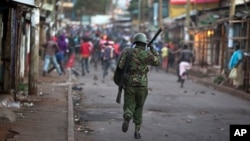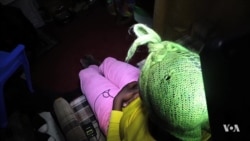August 11, 2017 is a day that Akinyi will never forget.
That evening Kenya's electoral commission announced the result of the August 8 election, showing President Uhuru Kenyatta had won with 54 percent of the vote.
Akinyi's neighborhood in Nairobi, the Dandora slum, descended into chaos. Youths started burning bonfires to show their displeasure with the outcome.
WATCH: Kenyan Police Raped Dozens During Election Period, Human Rights Watch Says
According to Akinyi, who asked that her real name not be used for this story, police started clearing roads and searching for troublemakers. She said police entered her block and instructed all men to come outside, including her husband.
Akinyi said three police officers walked into her room.
"When they walked in, they said to me 'I was the government property and I asked how, I am someone's wife.' They hit with the baton twice, " she recalled. "That's when I knew they were serious. Another one grabbed and tore my blouse saying to me 'you will know how you have become government property.' Then they raped me. It's painful and hard."
According to a Human Rights Watch report, Akinyi is not alone. The organization has documented 71 cases of rape and says the true number may be even higher, as other victims refuse to come out, fearing reprisal and victimization.
"The research did not really set out to determine the exact number of people who were raped during this period, said HRW senior women's researcher Agnes Odhiambo.
"But just to look at the patterns of the violence and the state response to the violence," she noted. "We found that half of the rapes were gun rapes involving two or more perpetrators and actually about half of these rapes were perpetrated by police or men in uniform."
Government spokesman Eric Kiraithe disputed the allegations, although he said all the cases will be investigated.
"But I can assure you," he said, "it's not unheard of for police officers to rape but certainly not usually in situation riots. In the situation of riot, and I read the description that report is based on fabricated evidence mainly."
Akinyi, doesn't know when she will get justice or even how to share her story with her family. For now, she finds comfort in alcohol to forget the events of that day and to get a peaceful sleep.






